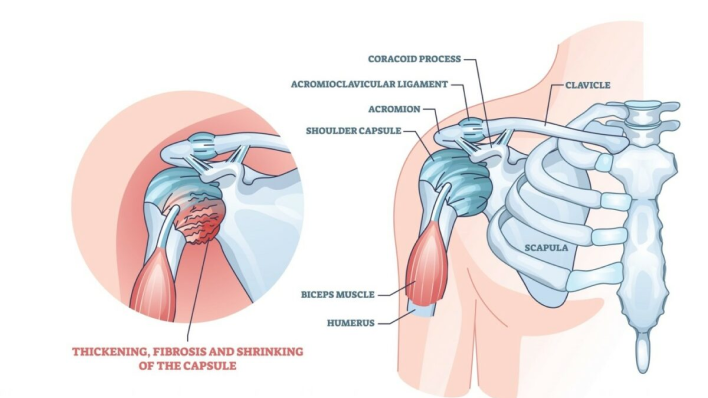Frozen Shoulder

You reach out for a cup of tea, only to find your shoulder protesting with a sharp pain. Are simple tasks becoming a herculean struggle for you as your arm feels frozen and stiff? Does this sound similar?
This is the frustrating reality of a Frozen Shoulder, a condition that steals your mobility and robs you of the joy of everyday movements. The pain can be debilitating, limiting your range of motion and leaving you feeling helpless. But you don’t have to endure this suffering alone.
At Tarabichi Joint Care, we understand how it affects every aspect of daily living. We employ an all-inclusive approach to restore your shoulder’s function and alleviate the pain. With our expert frozen shoulder treatment and care, you can reclaim your mobility and rediscover the simple pleasures of life.
Shoulder / Arm Pain Conditions
Understanding Frozen Shoulder
Also known as adhesive capsulitis, is a condition marked by shoulder pain that often restricts arm movement. This limited mobility can gradually lead to stiffness and even a reduction in range of motion.
The condition typically arises from inflammation in the shoulder joint capsule, a structure containing ligaments that connect the shoulder bones. When inflamed, this capsule tightens, preventing the shoulder bones from moving smoothly within the joint.
Anatomy of the Shoulder
The shoulder is a ball-and-socket joint comprising three bones:
- The humerus (upper arm bone)
- The scapula (shoulder blade)
- The clavicle (collarbone)
The rounded head of the upper arm bone fits into a shallow socket in the shoulder blade. This joint is encased by a strong connective tissue known as the shoulder capsule.
Synovial fluid lubricates the capsule and joint, allowing smooth shoulder movement.
In a frozen shoulder, however, the shoulder capsule thickens, becoming stiff and restricted. Bands of tissue, or adhesions, form, and the amount of synovial fluid in the joint often decreases.
Causes
Frozen shoulder may sometimes arise following an injury to the shoulder or arm. It can also occur after specific upper-body surgeries, such as shoulder surgery or open-heart surgery.
Nevertheless, in many cases, the cause remains unknown. Certain factors can raise the risk of developing, including:
- Being over the age of 40
- Being female
- Having diabetes
- Other medical conditions, such as thyroid disorders, Parkinson's disease, or cardiovascular disease
- Recent injury, trauma, or surgery, particularly if the arm was immobilized
Frozen Shoulder Symptoms
Some of the signs that indicate that you must reach out for treatment without much delay may include the following:
Three Distinct Stages of a Frozen Shoulder
- Freezing stage: Shoulder movement triggers pain, and the range of motion gradually decreases. This stage can last between 2 and 9 months.
- Frozen stage: Pain may start to diminish, but stiffness in the shoulder intensifies, making it increasingly difficult to use. This stage typically spans from 4 to 12 months.
- Thawing stage: Shoulder mobility slowly begins to improve, with this phase lasting anywhere from 5 to 24 months.
Frozen Shoulder Treatment
Treatment focuses on two primary goals: improving range of motion and reducing pain. To enhance mobility, physical therapy is often recommended. Our physical therapist at Dubai Physiotherapy and Rehabilitation Center at Tarabichi Joint Care will assist in stretching the shoulder capsule and will teach home exercises that may involve tools like a wand or overhead pulley. They may also apply ice, heat, ultrasound, or electrical stimulation as part of therapy.
The therapist will guide you through a stretching routine to perform once or twice daily, using items such as a cane, a pulley system, or an elastic band to increase shoulder mobility.
For pain management, doctors commonly advise anti-inflammatory medications. Pain relief may be prescribed for post-therapy discomfort or to aid sleep. In some cases, steroid injections into the joint or bursa may be necessary. Oral steroids might also be prescribed to help reduce inflammation.
If the symptoms do not respond to the conservative line of treatment, surgery may be recommended.
Seek Appropriate Frozen Shoulder Treatment at Tarabichi Joint Care
If you’re struggling with the pain and stiffness, Tarabichi Joint Care offers comprehensive, personalized treatment options to help you regain mobility and quality of life. Our team is committed to guiding you through each stage of Enhanced Recovery with advanced therapies and compassionate care.
Don’t let a frozen shoulder limit your life – seek expert treatment at Tarabichi Joint Care and take the first step toward lasting relief.
FAQ’S
Shoulder replacement surgery in Dubai is recommended during the ‘Frozen’ stage when severe pain and stiffened joint capsules persist after months of treatment. The most common procedures are shoulder manipulation or arthroscopic release, both aimed at freeing the joint and restoring movement.
Before surgery, complete any required tests, pause certain medications if advised, and arrange for post-surgery assistance.
Common procedures for shoulder replacement surgery in Dubai include:
- Manipulation under anesthesia: While you’re asleep, the doctor moves the shoulder to stretch or tear tight tissues, increasing motion.
- Shoulder arthroscopy: Small incisions allow the doctor to cut tight areas of the joint capsule using tiny instruments.
Often, both methods are combined for the best results, and most patients experience good outcomes.
Untreated frozen shoulder can lead to chronic pain, limited mobility, and potential muscle weakness around the shoulder.
